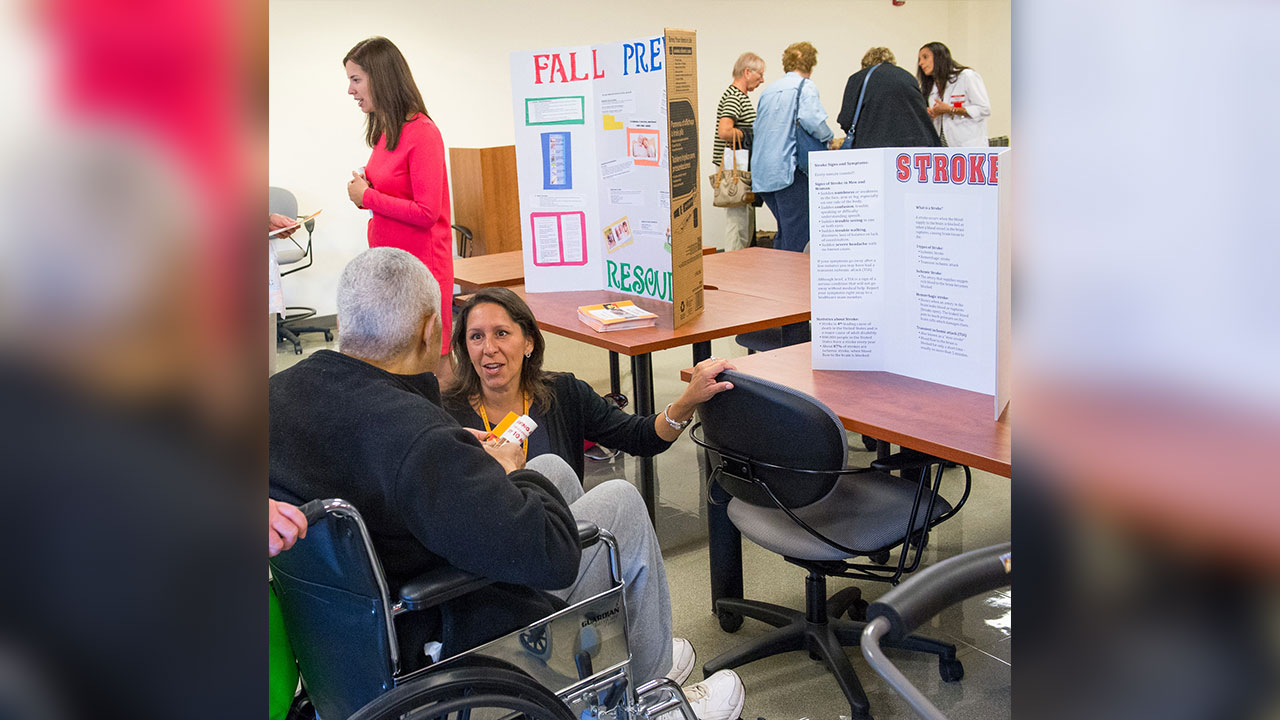[box]Tracy Van Oss, clinical associate professor of occupational therapy, talks to a senior citizen as part of Quinnipiac University’s National Falls Prevention Day activities on Sept. 23.[/box]
Sixty-four senior citizens from the area visited Quinnipiac University’s Center for Medicine, Nursing and Health Sciences on the North Haven Campus on Tuesday, Sept. 23 to learn about fall prevention. Sept. 23 was National Falls Prevention Awareness Day.
The event, sponsored by Quinnipiac’s National Institute for Community Health Education and Center for Interprofessional Healthcare Education, included students and faculty from athletic training, diagnostic imaging, the Frank H. Netter MD School of Medicine, nursing, occupational therapy, the physician assistant program, physical therapy and social work.
Christine Kasinskas, clinical assistant professor of physical therapy, coordinated the event. She targeted area assisted-living facilities, senior centers and doctors’ offices.
“My mother fell in the last month,” Kasinskas said. “My neighbor fell in the last month. It’s devastating. Sometimes, people are never able to return to their homes or get around the way that they want to. Falls can lead to traumatic brain injury and death. Once someone falls, they have a fear of falling so they limit their activities. They get weaker, they lose their flexibility, they lose their endurance and they are at higher risk for another fall. Education is so important.”
One out of three adults aged 65 or older falls each year, according to the Centers for Disease Control and Prevention. Among older adults, falls are the leading cause of both fatal and non-fatal injuries. The center reports that in 2010, 2.3 million non-fatal fall injuries among older adults were treated in emergency departments and more than 662,000 of these patients were hospitalized. In 2010, the direct medical costs of falls, adjusted for inflation, was $30 billion.
Quinnipiac’s National Falls Prevention Day activities included a panel discussion with students and, “Clara,” a high fidelity simulation mannequin who has taken a serious fall.
The students offered several tips for avoiding falls, such as making regular visits to the doctor and learning about the side effects of medications. They also stressed the importance of assistive devices, proper footwear and exercise and of having a well-lighted and hazard-free home.
Ben Fan, a sixth-year physical therapy student from East Brunswick, New Jersey, and Rebecca Choubah, a senior occupational therapy major from Dartmouth, Massachusetts, were among six students to speak to the visitors.
“Being able to prevent falls and address the issue before it is an issue is of crucial importance to us as providers,” Fan said.
Choubah added that the event was beneficial for the students as well as the senior citizens.
“We always say we learn so much more from them than they ever will from us,” Choubah said. “First-hand experience is vital to our practices.”
Following the panel discussion, the older adults visited Clara’s mock apartment at the center and were asked to identify multiple fall risks such as rugs that are not anchored properly and a walker that is poorly maintained.
Gloria McKee, a retired nurse, made the trip from Masonicare in Wallingford to learn about fall prevention.
“I’m loving it,” she said of the program. “The students here are wonderful.”
In addition, the event featured a light breakfast, raffle, free screenings and information booths about topics such as bone density, home safety and use of assistive devices.
Tracy Van Oss, clinical associate professor of occupational therapy, also helped organize the event.
“The students have learned a lot from the seniors that they could not get from sitting in the classroom,” Van Oss said.
